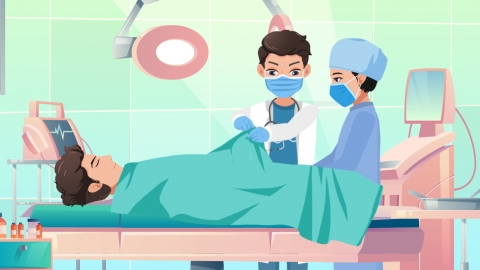What to do about adhesions after appendectomy
In general, the treatment methods for postoperative adhesions following appendicitis surgery mainly include conservative management, medication, gastrointestinal decompression, traditional Chinese medicine (TCM), and surgical intervention. Specific analyses are as follows:

1. Conservative Management
Patients should remain in bed and adopt a semi-recumbent position to reduce abdominal tension and alleviate pain. Dietary adjustments are recommended: starting with liquid foods in the early stage, gradually transitioning to semi-liquid and easily digestible solid foods, while avoiding spicy, greasy, raw, or cold foods that may irritate the intestines. Additionally, keeping the abdomen warm is important to prevent chills from exacerbating intestinal spasms and worsening discomfort caused by adhesions.
2. Medication
Patients may take anti-infective medications such as ceftriaxone sodium for injection and metronidazole injection under medical guidance to prevent or control inflammatory responses at the site of adhesion. For symptoms like abdominal pain and bloating, pinaverium bromide tablets can be used to relieve smooth muscle spasms in the intestine and improve discomfort. Lactulose oral solution may also be administered to regulate bowel function, promote defecation, and reduce the risk of intestinal obstruction.
3. Gastrointestinal Decompression
A nasogastric tube is inserted through the nose into the stomach to continuously remove gas and fluid from the gastrointestinal tract, thereby reducing intra-intestinal pressure, relieving bloating, and alleviating compression of the intestines due to adhesions. This method allows the intestines to rest fully, reduces the burden of peristalsis, and creates favorable conditions for recovery at the adhesion site. It is suitable for patients with mild intestinal obstruction caused by adhesions.
4. Traditional Chinese Medicine (TCM)
According to TCM theory, postoperative adhesions are associated with stagnation of qi and blood and blocked meridians. Treatment focuses on promoting blood circulation to remove stasis and regulating qi to restore bowel function. Oral administration of herbal formulas such as Xue Fu Zhu Yu Wan (Blood House Stasis-Dispelling Pills) and Mu Xiang Shun Qi Wan (Aucklandia Root Smooth-Qi Pills) can help improve circulation of qi and blood and relieve abdominal pain and distension caused by adhesions. Additionally, acupuncture and moxibustion applied to the abdomen can regulate intestinal function and enhance local blood circulation, thus helping to alleviate adhesion-related symptoms.
5. Surgical Treatment
For patients with severe adhesions causing complete intestinal obstruction or recurrent episodes of intense abdominal pain, surgical intervention is necessary. Common procedures include adhesiolysis and bowel resection. These surgeries aim to separate adhered intestinal tissues, relieve intestinal obstruction, restore normal bowel patency, and prevent further deterioration of the condition.
In addition, during treatment, patients should cooperate with medical examinations and nursing care as directed. Abdominal symptoms should be monitored regularly. If abnormal conditions such as fever, worsening abdominal pain, or cessation of bowel movements and flatus occur, they should promptly inform their doctor so that the treatment plan can be adjusted accordingly. Early ambulation after surgery is also an effective measure to prevent worsening of adhesions.





